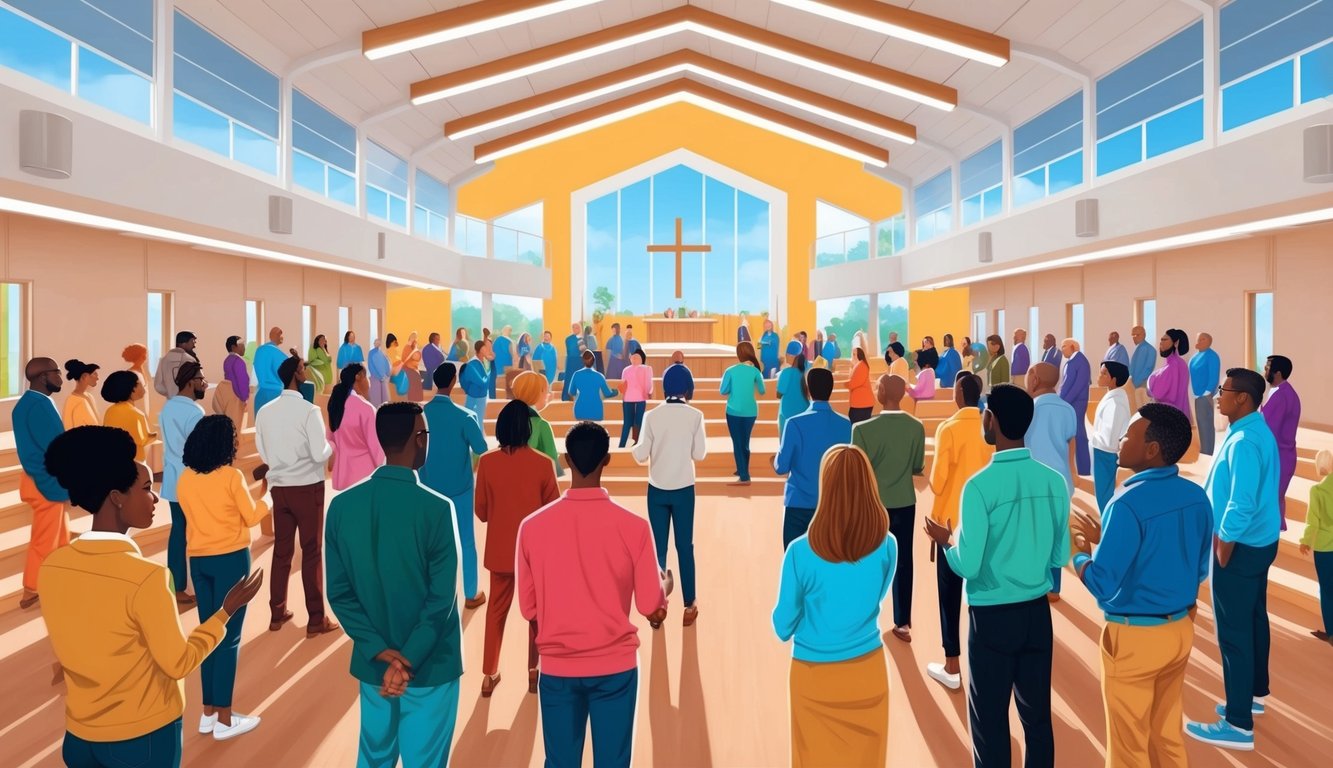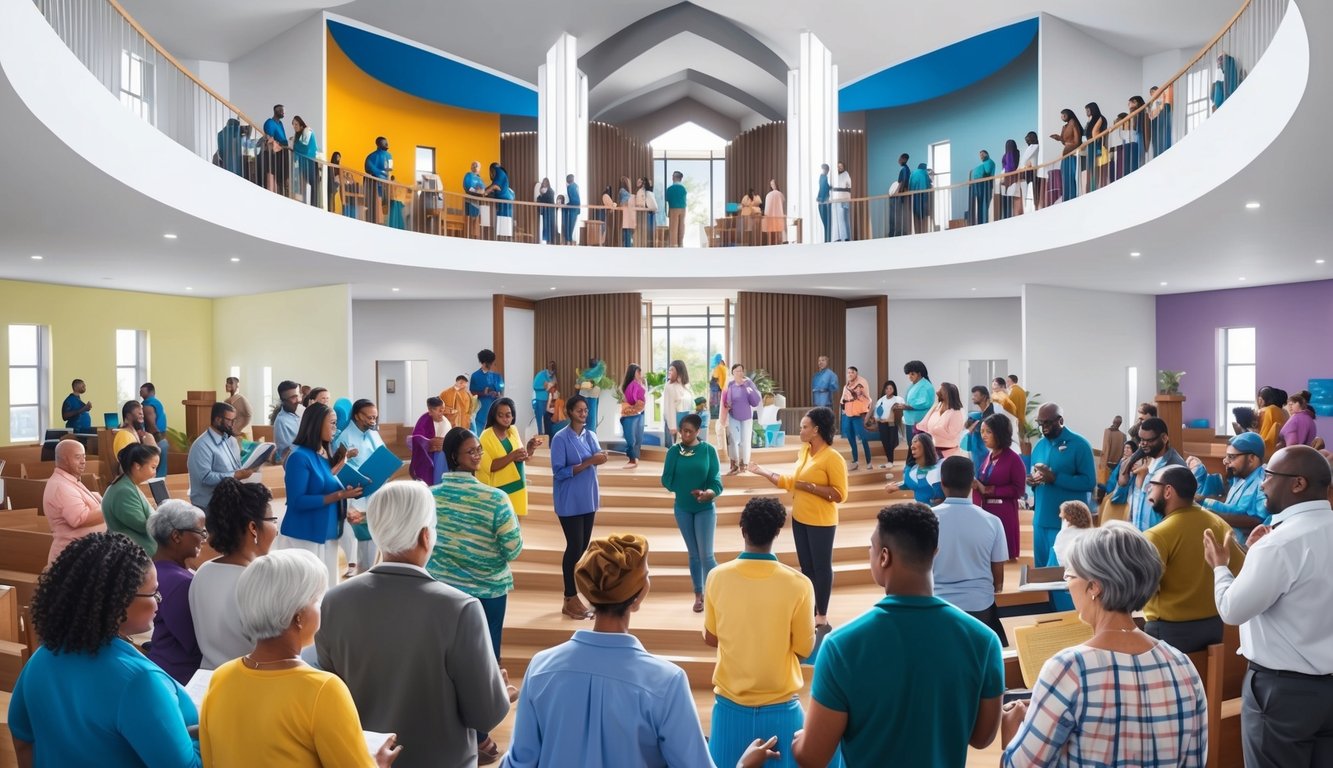Don’t Miss Out On This Unique Astrological Opportunity
Are you tired of spinning your wheels and getting nowhere? Simply put, you’re out of sync: you’re out of alignment with your astral configuration.
But: there’s a kind of map that can help you reclaim your alignment. Think of it as your own personal blueprint to success and happiness: a blueprint that will help you live your most amazing life.
Get started here.
Are you curious about non-denominational churches and how they fit within Christianity? Non-denominational churches have gained popularity because they often emphasize a personal relationship with God over strict adherence to a set denominational doctrine.
These churches focus on a personal interpretation of the Bible, which can lead to more diverse beliefs within their congregations.
Many people are drawn to non-denominational churches for their welcoming atmosphere and emphasis on individual spiritual growth.
These congregations often provide a sense of community that encourages open discussions about faith and beliefs without the boundaries that some traditional denominations might impose.
You might find that this approach resonates with your personal journey in Christianity.
Exploring a non-denominational church might offer you fresh insights into your beliefs and spirituality.
As these congregations often organize around shared values rather than rigid doctrines, you’ll likely find a diverse group of individuals united by a common faith.
Understanding more about these churches could open new doors in your spiritual exploration.
Understanding Non-Denominational Churches
Non-denominational churches hold distinctive beliefs and practices that set them apart from traditional denominational churches.
They emphasize personal connections with faith and often offer unique worship experiences.
This section explores their core beliefs, compares them to denominational churches, and highlights why many people find them appealing.
Core Beliefs and Practices
Non-denominational churches often focus on a direct interpretation of the Bible.
They may not adhere to a specific doctrine dictated by a centralized authority.
Instead, they rely on individual church leaders to guide interpretations of scripture.
Worship services in these churches tend to be casual and contemporary.
Instead of traditional hymns, you might hear modern Christian music.
This can make the church feel more accessible to newcomers.
Fellowship is also a key component.
These churches often prioritize community activities, giving members opportunities to connect with each other outside of regular services.
Comparison to Denominational Churches
Denominational churches are usually part of larger networks with shared beliefs and governance.
They follow specific doctrines and have established practices that may span centuries.
In contrast, non-denominational churches often have more flexibility in interpreting the Bible.
Non-denominational churches typically prioritize individual church governance.
This means that services, teachings, and community activities are led by local leaders rather than by a denominational hierarchy.
The difference in structure can result in varied worship experiences.
Traditional churches might offer more structured services, while non-denominational churches could have a more spontaneous feel.
The Appeal of Non-Denominational Christianity
For many, the appeal of non-denominational Christianity lies in its flexibility and personal approach.
The lack of rigid denominational affiliations allows these churches to be adaptive and responsive to the needs of their congregations.
The focus on community and straightforward teachings can make faith feel more relevant and engaging.
People may feel a personal connection with their church, as they are often more involved in decisions and activities.
This sense of involvement helps foster a supportive environment where individuals can grow spiritually and strengthen their relationships with others.
By applying Christian living principles in daily life, members may feel a greater sense of purpose and alignment with their faith.
This active participation can lead to a more meaningful and fulfilling religious experience.
Non-denominational churches can be inviting for those seeking a personal spiritual journey.
The absence of strict denominational boundaries creates an inclusive environment where individuals from diverse backgrounds may feel welcome.
Historical Context and Growth

Non-denominational churches have a rich history that plays a significant role in their growth around the world today.
Their roots and development can be traced back to several key movements and trends.
Roots in the Restoration Movement
The Restoration Movement, which began in the early 19th century, aimed to restore Christianity to its original roots by rejecting denominational divisions.
This movement sought to focus on unity and the direct teachings of the Bible, without the added creeds and doctrines of traditional denominations.
Early participants, like Alexander Campbell and Barton Stone, emphasized a return to simple New Testament Christianity.
This focus on independence and self-governance laid the groundwork for many non-denominational churches, encouraging congregations to operate free from hierarchical structures.
The influence of this movement can still be seen today in how non-denominational churches prioritize biblical authority and congregational autonomy in their practices and beliefs.
Evolution in the United States
In the United States, non-denominational churches began to gain traction especially during the mid-20th century.
This was a time of significant change, with many individuals seeking a more personalized and less bureaucratic approach to faith.
These churches often appealed to those who wanted a relationship with God that was direct and not mediated through traditional denominational structures.
Many of these congregations started as independent churches, offering services that were flexible and adaptable to local needs.
As the cultural landscape shifted, these churches played a role in the broader movement towards more contemporary worship styles and community-focused ministry, which helped in their expansion and appeal.
Contemporary Global Presence
Today, non-denominational churches have a significant global presence.
As they continue to grow, many of these communities focus on inclusivity and cultural relevance.
They often incorporate modern music and technology into their services, engaging diverse groups of people.
The global growth is evident as they adapt to local contexts, addressing the unique spiritual and communal needs of individuals in different regions.
Non-denominational churches often work as networks or associations of independent churches, sharing resources and support while maintaining autonomy.
This model allows them to thrive in various settings, from urban centers to rural areas, making them an increasingly influential part of the global Christian landscape.
Worship and Community Life

In a non-denominational church, worship and community life often reflect a blend of modern and traditional values.
These churches offer diverse worship styles, foster strong community ties, and engage in various youth and outreach programs to support and inspire members.
Worship Service Styles
Non-denominational churches often offer a variety of worship service styles to cater to different preferences.
You might experience contemporary music with a band, traditional hymns, or even a mix of both.
Some congregations use multimedia presentations to enhance the service, making it more engaging.
A central focus is to create a welcoming environment where everyone feels comfortable participating.
The structure of these services can vary, providing a unique experience that emphasizes personal connection and spiritual growth.
Community and Fellowship
Community and fellowship are vital aspects of non-denominational churches.
These churches emphasize building strong ties among members, encouraging regular gatherings outside of traditional services.
Small groups or home groups often meet during the week, providing a space for deeper connections and mutual support.
Events such as potlucks, picnics, and volunteer opportunities bring everyone together, fostering a sense of belonging.
This approach not only strengthens individual relationships but also supports the overall church community, making it vibrant and inclusive.
Youth and Outreach Programs
Youth and outreach programs play a significant role in non-denominational churches.
Young members often have dedicated activities and groups that help them explore their faith while building friendships.
These might include youth camps, Bible studies, and service projects.
Outreach programs aim to serve the broader community through initiatives like food drives, tutoring programs, and community service activities.
By focusing on outreach, the church not only extends its impact beyond its congregation but also embodies the biblical mandate to love and serve others.
Leadership and Organization

In a non-denominational church, leadership and organization play crucial roles.
The structure often emphasizes pastoral roles, shared governance among church elders, and a commitment to financial transparency, which helps in building trust and community engagement.
Pastoral Roles and Elders
You will often find that the pastor is a key figure in a non-denominational church.
The pastor not only delivers sermons but also provides spiritual guidance and counseling.
In addition to the pastor, elders often hold significant responsibilities.
These elders are usually respected members of the congregation who assist in decision-making and provide guidance based on biblical principles.
The collaboration between the pastor and elders ensures that the church operates smoothly and that members’ spiritual needs are met.
Elders often serve as mentors to newer members and help oversee various church activities.
Governance and Decision Making
In non-denominational churches, governance is often more flexible than in traditional denominations.
Self-governing systems are common, where decisions are made collectively by the pastor, church elders, and sometimes congregation members.
This collective approach can encourage more voices to be heard and helps the community feel included in important decisions.
When it comes to church policies or activities, many non-denominational churches rely on a democratic process.
Voting or consensus-building meetings are held, fostering a sense of ownership among members.
The aim is to reflect Christian values in every decision, ensuring decisions align with the beliefs of the church community.
Financial Transparency
Financial transparency is especially important in maintaining trust within the church.
Most non-denominational churches implement clear processes for handling finances.
This includes regular financial reports shared with the congregation and detailed budgets that show how contributions are being used.
Clear communication about financial matters helps build confidence and encourages more people to contribute to the church’s mission.
Openness about finances is often complemented by the responsible stewardship of resources, ensuring that funds are used to support both the local community and broader church initiatives.
This commitment to transparency not only adheres to ethical standards but also strengthens the community’s bond of trust.
Non-Denominational Beliefs in Action

Non-denominational churches practice certain beliefs through activities like baptisms and the sharing of communion.
They tend to have distinct views on social and ethical issues which affect their followers.
Additionally, they contribute to the ongoing efforts for Christian unity and collaboration among different faith communities.
Baptisms and Communion Practices
In non-denominational churches, rituals like baptism are seen as personal commitments to faith, rather than mandatory steps.
These churches often practice baptism by full immersion, echoing practices from early Christianity.
It’s meant to symbolize a fresh start or a personal decision to follow Jesus.
Communion, also known as the Eucharist, is typically celebrated in a simple, inclusive manner.
It varies by church but generally involves bread and grape juice, focusing on remembering Jesus’ sacrifice.
Unlike some more traditional churches, participation in communion is often open to anyone who shares the faith, regardless of church membership.
Social and Ethical Stances
Non-denominational churches often tackle social and ethical issues from a biblical perspective.
They may focus on helping local communities through outreach programs and charitable works, emphasizing love and compassion.
Ethical stances in these churches can vary, but they generally encourage followers to live in ways that align with their interpretations of biblical teachings.
This might include supporting family values, engaging in honest work, and acting with integrity in daily life.
Advocacy on broader social issues may depend on the individual church’s focus and the needs of the community it serves.
Role in Ecumenism and Christian Unity
Non-denominational churches often participate actively in efforts to unite different Christian denominations.
They strive to focus on shared beliefs and minimize doctrinal differences that might divide followers.
These churches frequently collaborate with others to sponsor events or community service projects.
By emphasizing shared values like compassion and faithfulness, they contribute to a broader sense of Christian unity.
This approach helps bridge gaps between various denominations, fostering a spirit of cooperation and understanding.



